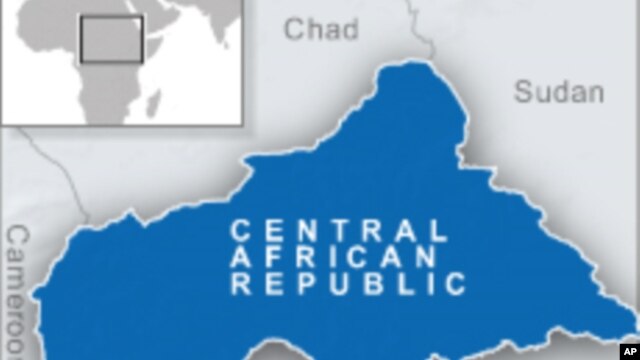
Central African Republic.
DAKAR — Rebels in control of the Central African Republic (CAR) clashed with youth protesting in the capital, Bangui, on Friday. The violence killed at least two rebels and one civilian, according to witnesses. Human Rights Watch (HRW) says members of the Seleka rebel coalition that overthrew the CAR's government in March are committing "rampant abuses" against villagers in rural areas around the capital.
It's been three months since the Seleka rebel coalition took over the Central African Republic.
Young people took to the streets of their Bangui neighborhood Friday to protest the alleged murder of a college student. The student was found dead the day after witnesses say armed Seleka rebels kidnapped him from his classroom.
Residents say abuses against civilians in the capital have continued unabated since rebels seized the capital on March 24.
Human Rights Watch says rebels are also attacking the population in rural areas around the capital. HRW says Seleka fighters have killed at least 40 civilians and razed at least 34 villages since February.
HRW Africa researcher Lewis Mudge says the group has documented villages attacked as recently as June.
"In village after village, it was almost the same message which was to 'please send help.' These were villages that were attacked intentionally by Seleka and civilians were shot as they were trying to flee," Mudge said. "They are now living outside of their villages in the bush and in the surrounding forests where they have very, very minimal access to any kind of humanitarian support."
Villagers told HRW that dozens are dying in the forest for lack of assistance.
Aid agencies say this is the "worst humanitarian crisis the country has ever known." Insecurity has pushed more than 200,000 people to flee their homes in the past six months. More than 60,000 people are suffering from severe food shortages.
HRW says Seleka forces, in uniform, have targeted some rural communities outside Bangui to quell resistance or to pillage.
Mudge said some attacks were carried out alongside armed members of the Mbarara community, nomadic herders from Chad who appear to be working with Seleka.
"They might have had an altercation over something like a cow or a goat, in which the Seleka or a member of this [herder] community was trying to steal it… The Seleka would attack villages completely indiscriminately on the same road if they heard an attack took place against a Seleka. They would burn hundreds of houses in retaliation," Mudge said.
HRW says more than 1,000 houses have been burned in the the provinces to the southeast and the north of the capital.
Several rebel leaders in the capital, contacted by VOA, declined to comment on HRW's findings.
Mudge said Seleka appears to be changing its commanders in the provinces "every month or six weeks."
"Outside of Bangui in the provinces, the Seleka don't seem to know to know really who is responsible for the acts that they claim happened before they arrived…. In the towns that we visited, we found very minimal civil, police and judicial authority," Mudge said. "There is no state outside of Bangui for all intents and purposes."
A regional peacekeeping force sent by the Economic Community of Central African States has been largely concentrated in the capital.
HRW is calling on the United Nations Security Council to consider sanctioning Seleka's leaders and to support the deployment of additional regional troops to the CAR to protect civilians. |
|
